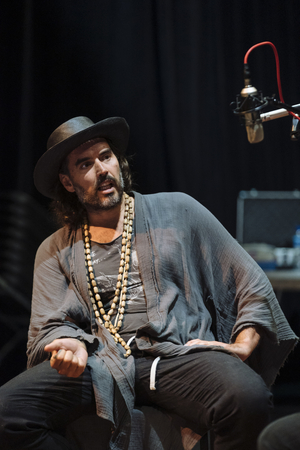Review: 'WHAT I LOVE' WITH RUSSELL BRAND, Podcast
The latest podcast from Ian Rickson where he interviews the comedian, actor and activist

![]()
The latest interview between acclaimed director Ian Rickson and members of the arts community has just dropped. Russell Brand has been a frequently controversial public figure; a comedian, presenter, actor and now a podcast host and advocate for awareness about mental health.
Recorded on the stage of Brand's local arts centre, Norden Farm Centre for the Arts in Maidenhead, Brand is now a Berkshire boy, having moved out of London a few years ago. He muses on how odd the emptiness of the venue is, when it was created for communal experiences. He reveals that he uses the venue himself to try out material and meet the mix of local people.
Bill Hicks' 1993 film, Revelations, is Brand's film pick; focusing on comedian Hicks' last tour. Brand was 18 when he became aware of Hicks', after his death at the age of just 32. He points out what he sees as Hicks' unique qualities; his vitality and passion combined with mischief, but how he is also very controlled, despite the veneer of spontaneity. Brand reveals he likes to leave space for unplanned segments in his own shows; he enjoys the chaos himself and says he lacks the discipline to return to a regulated format.
The parallels between the style of the two comics is easy to see. Hicks was a comedian who was uncompromising on holding the powerful to account. He raged against politicians, the war on drugs and capitalism. Brand sees him as a prophet-comic, a preacher who wanted to get his own views across the masses.
These days, much of his routines is seen as misogynistic and full of toxic masculinity. His social rage was often incredibly observant, but also very offensive. It's not surprising that Brand has picked a film featuring Hicks; he has often cited him as a great influence and was never far from controversy and outrage in his earlier career.
Rickson focuses on Hicks' various addictions and how when he became sober, was an even braver performer. How Brand musing on using the truth of who you are and who you intended to be is an interesting, if a little meandering, thought process.
Brand's choice of writing is Oscar Wilde's devastating beautiful children's book The Selfish Giant. Brand first read it as a teenager but has returned to it repeatedly. Wilde's giant banishes children from his beautiful garden and so it remains winter. One day some children creep into his garden and the giant is awakened by the sight and sounds of a spring day. The giant recognises his selfishness and allows all children to play in his garden. The story has significant religious themes, with beauty, reconciliation and death all combined.
Brand talks of the small boy who the giant helps to climb into the tree as the symbol of allowing beauty and love into your heart. He reveals he has not read the book to his own children yet; he suggests they are too young to learn that death is always present and inevitable.
Those who know Brand's style will be familiar with his loquacious and rather rambling style as he talks about his 'mid-life crisis'; recognising that his wild youth is gone and allowing its 'death', as he calls it. Fatherhood, or the prospect of it, was clearly a motivation for change, as is a concentration on meditation and self-awareness.
'When I Remember This Life' is his song choice. From the Japanese animated film The Tale of the Princess Kaguya, Kazumi Nikaido's song is a gentle lullaby telling the story of profound love and comfort of another.
Brand talks movingly about when his first daughter was born and how he felt that this song reflected the 'holy' experience of having a newborn in the house. The themes in the song of feminism, beauty, sorrow, and particularly the responsibilities of parenting are elements that seem to resonate deeply with Brand. He wants to send his daughters into the world able to deal with life.
Parts of this podcast, such as the concept of 'the grail' and needing to be open to listening to the 'whispers on the wind' might jar with some listeners in its overtly spiritual and new-world connotations, but they also feel authentic to Brand. He is highly eloquent and thoughtful, but his verbosity and themes may feel inaccessible or even impenetrable for some.
It feels like this episode is much more like an interview between the men, rather than the more equally-weighted, conversational tone of other episodes. Brand does not need any prompting; his choices are clearly very personal and is more than happy to share his tumbling thoughts.
The What I Love Podcast is available now with more new episodes to follow
Photo Credit: Helen Murray
Reader Reviews
Videos

